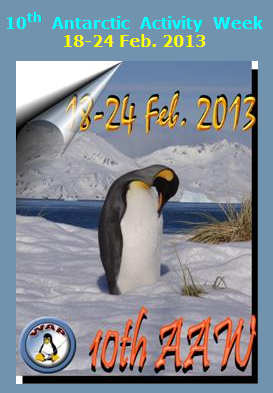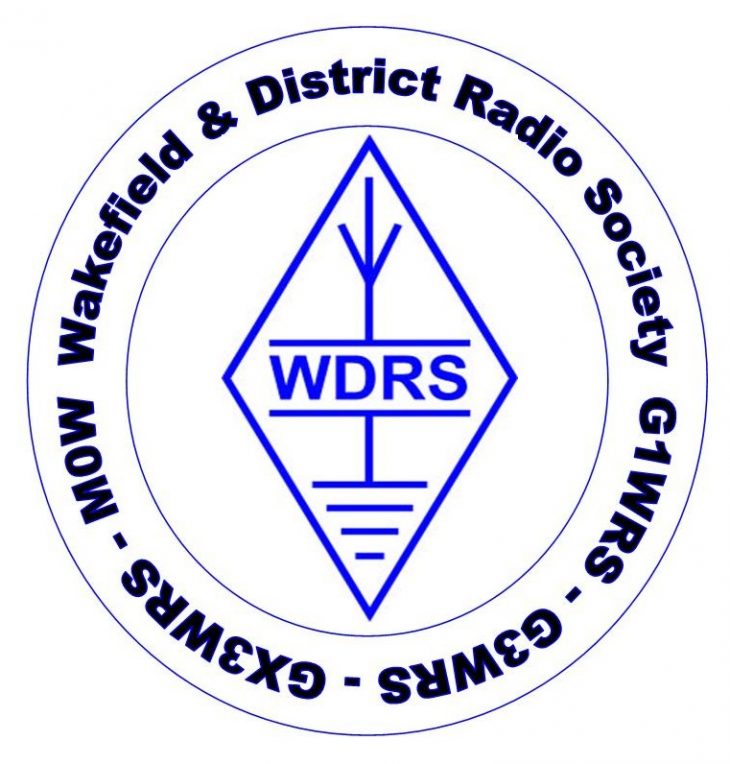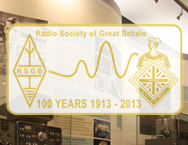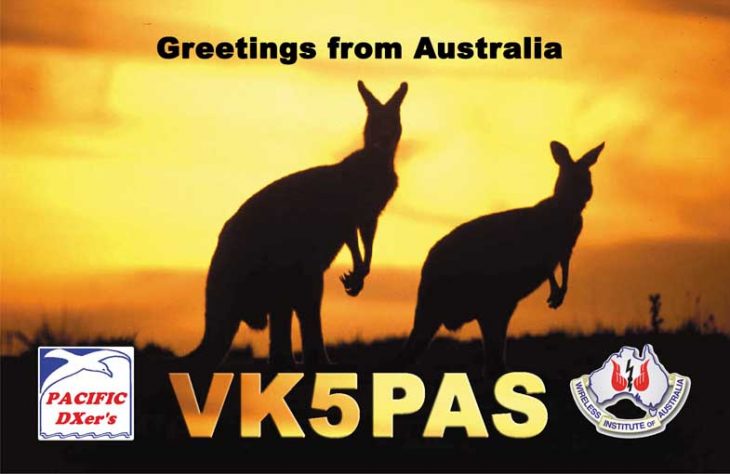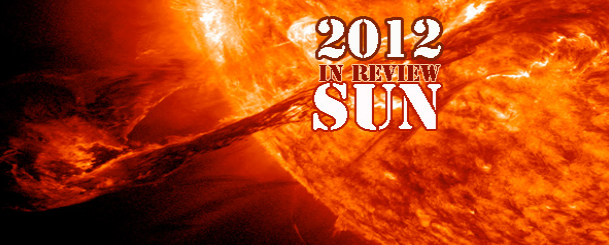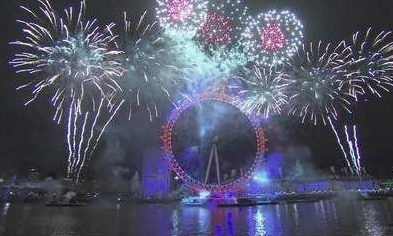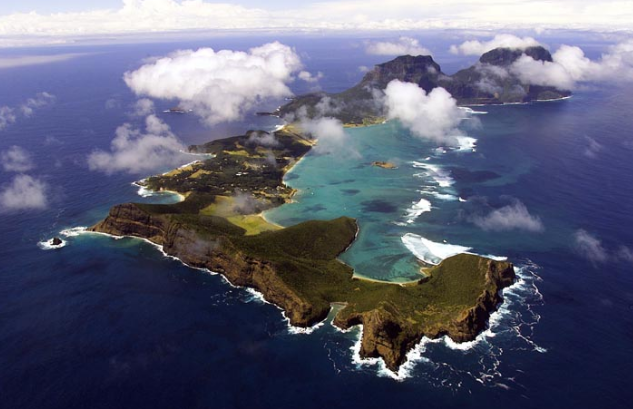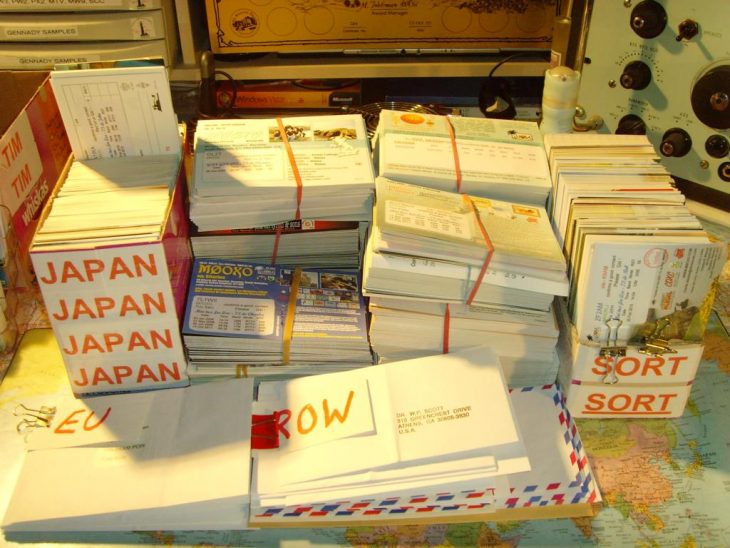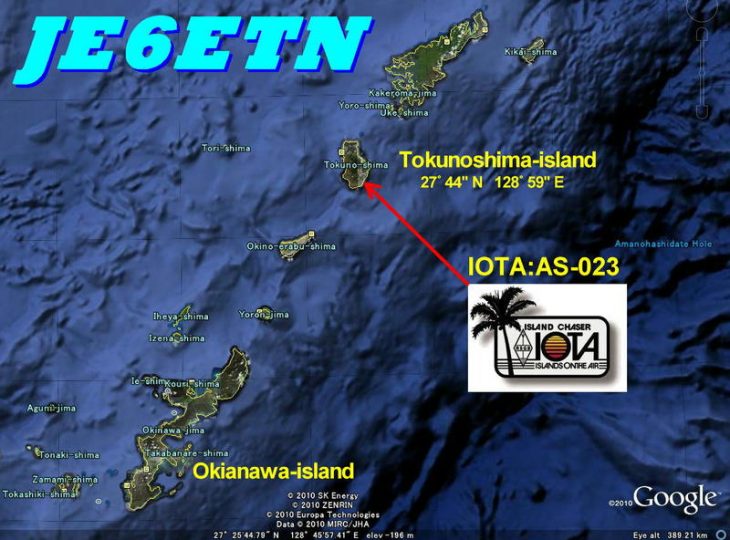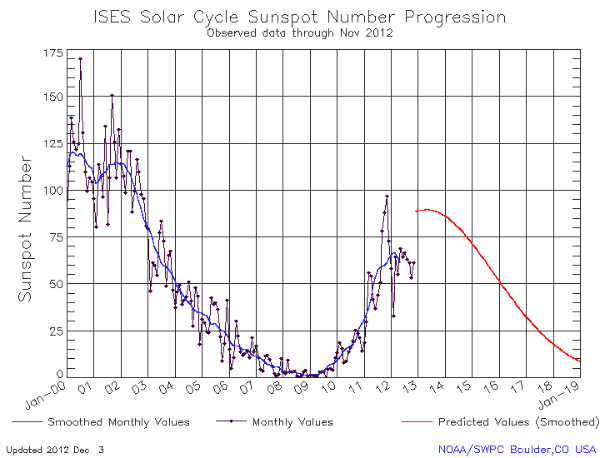
The current solar cycle is currently the subject of research, as it does not appear to be generating sunspots in the manner which would be expected. So far, Solar Cycle 24 is underperforming even compared to the NOAA-led Solar Cycle Prediction Panel‘s low expectations. There is still a strong chance that Cycle 24 will rebound and peak in 2013 as expected.
Sunspots did not begin to appear immediately after the last minimum (in 2008) and although they started to reappear in late 2009, they are at significantly lower than anticipated.
2012 Solar activity overview
If you’re not familiar with terms used in solar activity and space weather, read solar basics in our Guide for Solar Watchers first to find out what are solar cycles, structure of the Sun, solar magnetic field, sunspots, solar flares, solar wind, solar flares, CME, geomagnetic storm, auroras and other features of the Sun.
Overview
The biggest flares are known as “X-class flares” based on a classification system that divides solar flares according to their strength. The smallest ones are A-class (near background levels), followed by B, C, M and X. Similar to the Richter scale for earthquakes, each letter represents a 10-fold increase in energy output. So an X is 10 times an M and 100 times a C. Within each letter class there is a finer scale from 1 to 9.
X-class flares can produce as much energy as a billion hydrogen bombs. In 2011 we had 8 X-class solar flares with biggest reaching X6.9 on August 9, 2011 which ranked as the strongest solar flare in Solar cycle 24. This year we saw 7 X-class solar flares with strongest registered as X5.4 on March 7. It was the second strongest solar flare in Solar cycle 24. Fermi Gamma-ray Space Telescope detected in this powerful flare the highest flux of gamma rays—greater than 100 MeV—ever associated with an eruption on the Sun.
March and July were the most active months with three X-class flares and 19 M-class solar flares in March and two X-class and 29 M-class solar flares in July. Few sungrazing comets, with Comet Swan being the most spectacular, transit of Venus in June, epic solar filament eruptions, giant sunspots, largest solar radiation storm since 2003 and wonderfull auroras, as well as solar eclipses, made this year exciting to watch considering solar activity. We expect far more activity as we step into 2013 which is forecasted as peak of Solar Cycle 24.
2012 X-class solar flares
January 27
X1.7
March 5
X1.1
March 7
X5.4
March 7
X1.3
July 6
X1.1
July 12
X1.4
October 23
X1.8
So, lets take a look at solar activity montly reports from 2012:
January
The month started with ionospheric disturbances and minor geomagnetic storming with wonderfull aurora display. The Sun alone, was pretty quiet in the first half of the month. On January 18, newly formed Active region 1401 erupted with M1.7 solar flare. The day after, M3.2 flare erupted followed by a full-halo CME. This CME hit the Earth’s magnetic field in early hours of January 22, with minor geomagnetic disturbances reported. There were 13 active regions facing Earth at the time.
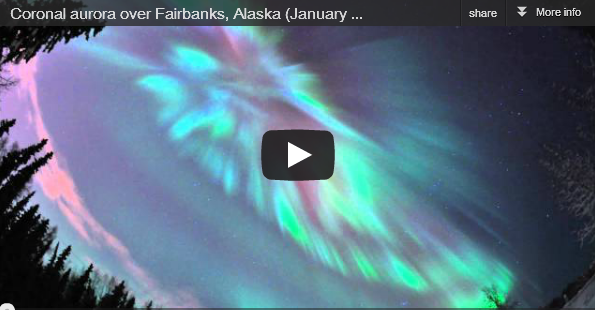
Sunspot 1402 erupted a long-duration M8.7-class flare, followed by a CME, on January 23. R2 Radio Blackout resulted and a 19 minute long, 10cm Radio Burst (TenFlare) was detected as well. This event produced a Full-Halo Coronal Mass Ejection (CME). Protons greater than 10 MeV increased to around 6300 pfu. The redulting S3 radiation storm was ranked the largest Solar Radiation storm since October 2003. S3 solar radiation storm is classified as STRONG radiation storm that can cause isolated reboots of computers onboard Earth-orbiting satellites and made noise in imaging systems, reduction of efficiency in solar panel, it can degraded HF radio propagation through the polar regions and caused errors at navigation position. S3 solar radiation storm can also influenced passengers and crew in high-flying aircraft at high latitudes due to radiation exposure. At this level of solar radiation astronauts on EVA are reccomended to take radiation hazard avoidance.
The CME impact strongly compressed Earth’s magnetic field and briefly exposed satellites in geosynchronous orbit to solar wind plasma. Shifting lines of magnetic force induced strong ground currents in Norway and sparked bright auroras over the upper reaches of North America.
Sunspot 1402 unleashed a X1.7 flare on January 27, prompting NOAA’s Space Weather Prediction Center to issue a R3 (strong) Radio Blackout warning and a S2 (moderate) Solar Radiation Storm warning. R3 Level Radio Blackout led to the fading of HF signals on the sunlit side of Earth. This event generated Type II and Type IV sweep frequency events. A 10cm Radio Burst (TenFlare) lasting 37 minutes was observed and measured 810 pfu. Sunspot 1402 was rotating onto the far side of the sun, so the blast site was not facing Earth. The explosion also produced a huge CME, but not Earth-oriented.

Image sequence of SOHO’s LASCO C2 show t X1.7 flare eruption

An X1.7 flare and a coronal mass ejection (CME) erupted from the Sun on January 27-28, 2012 from the same active region that produced a smaller but Earth-directed storm a few days earlier. This resulting solar storm was not squarely Earth-directed, but the clouds of high-energy protons that it emitted continued to hit the SOHO spacecraft detectors for over a day and did generate a minor radiation storm on Earth. The CME raced away from the Sun at a fast at 2500 km/s or 5.6 million mph.
Alltogether, we saw 3 M-class and one X-class solar flares in January which produced the largest S3 Solar Radiation storm since October 2003.
First solar activity in 2012 – Ionospheric disturbance and wonderfull auroras
Solar wind stream blowing from big coronal hole, new sunspot regions forming
Solar activity increasing – M-class flares, auroras and magnetic filaments
M3.2 solar blast from Sunspot 1402 produced Earth-directed CME on January 20
CME impact strongly compressed Earth’s magnetic field and produced auroras on January 23
A strong solar flare reaching M8.7 erupted on January 23
Increased solar activity after strongest solar radiation storm since 2006
CME impact! This is now the largest solar radiation storm since October 2003
X1.7 solar flare – the 7th largest in Solar Cycle 24
S2 radiation storm generated by X1.7 solar flare in progress
February
February started quietly with some geomagnetic disturbances and bright auroras related to X1.7 flare from January 27. Active region 1410 generated long duration M1.0 flare on February 6. Rest of the month was mostly quiet. On February 21, the Moon came in between the SDO satellite and the Sun. For 1 hour and 41 minutes SDO observed the Lunar Transit. This event only happens a few times a year but gives the SDO Team an opportunity to better understand the AIA instrument on SDO and give it a fine tune. From February 23 through February 24 our Sun produced an astonishing five solar eruptions, launched from the top, bottom, left and right sides of the solar disk.
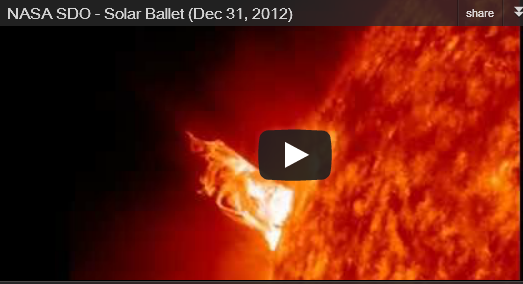
We also witnessed lunar transit via SDO which was rather interesting to watch.
Return of the old Sunspot 1402
Intensified solar activities – M1 solar flare and space directed CME on February 6
Solar activity is picking up again
Solar filament channel eruption and aurora forecast
March
March 2012 was extremely exciting month to watch in terms of solar activity. It was one of the most active months of Solar Cycle 24, with 19 M-class, 3 X-class flares and the highest flux of gamma rays – greater than 100 MeV – ever associated with an eruption on the Sun. Also, sungrazing Comet Swan gave amazing solar dive event observation.
Active region 1429 erupted an X1.1 flare on March 5 with Earth-directed CME. It was followed by several minor C and M-class flares in chain. The wave of high energy electromagnetic rays reached Earth in minutes and caused R3 (strong) radio blackout over China, India and Australia. Two days after, the wave of plasma arrived at the Earth and caused a G2 (moderate) geomagnetic storm.
After releasing up to nine M-class flares in only one day, the Active region 1429 erupted a powerful X5.4 flare on March 7. A related CME impacted the Earth on March 8, causing a G3 (strong) geomagnetic storm. This event marked the second strongest solar flare of Cycle 24 in terms of X-ray flux. NOAA/SWPC issued R3 (strong) radio blackout and a S3 (strong) solar radiation storm alerts.
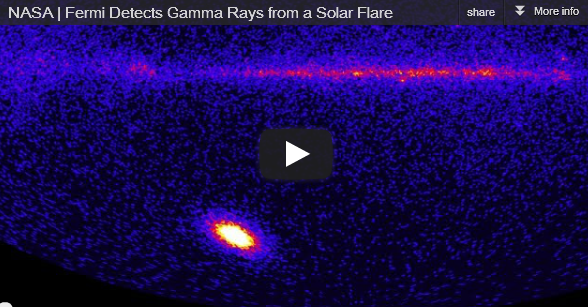
Just one hour after that first flare, nearby Active region 1430 released powerful X1.3 flare. NASA reported that during it Fermi Gamma-ray Space Telescope detected the highest flux of gamma rays—greater than 100 MeV—ever associated with an eruption on the Sun.
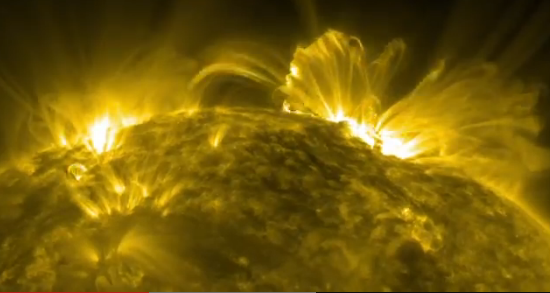
Sunspot 1429 rotated toward the other side of the Sun and generated a M6.3 flare on March 9, a M8.5 flare on March 10 and a M7.9 flare on March 13. These eruptions hurled Earth-directed CMEs which caused mostly G2 (moderate) geomagnetic storms.
US Air Force Space Command reported that the solar storms of March 7–10 could have temporarily knocked American military satellites offline. NASA also reported that these powerful flares heated the Earth’s upper atmosphere with the biggest dose of infrared radiation since 2005. From March 8 to March 10, the thermosphere absorbed 26 billion kWh of energy. Infrared radiation from carbon dioxide and nitric oxide, the two most efficient coolants in the thermosphere, re-radiated 95% of that total back into space.
Moderate M2.8 occurred on March 14 and M1.8 on March 15, both generated by Active region 1432.
Sungrazing Comet SWAN dove into the Sun’s atmosphere late on March 14. SOHO’s two coronagraphs followed the comet’s track from when it first appeared on Mar 13 through its apparent demise after it made a beeline right towards the Sun. Comet SWAN was a Kreutz sungrazer, a fragment of the same ancient comet that produced sungrazing Comet Lovejoy in December 2011.
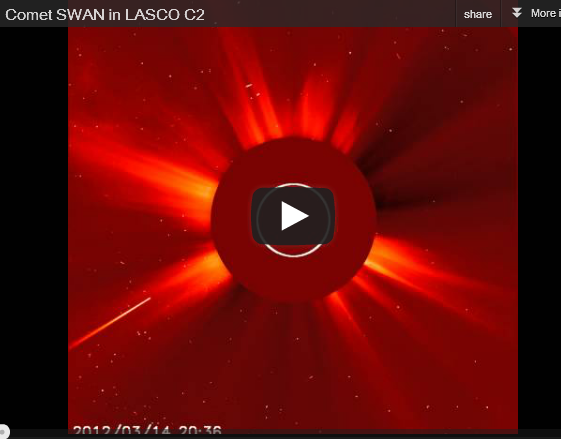
Active region 1434 located in the southern hemisphere, produced a rapid M1.3 flare on March 17, 2012. A Type II Sweep Frequency Event with a velocity of 1140 km/s was detected as well. Old Sunspot 1431 produced a minor C6.5 flare, followed by a moderate M1.0.
Moderate M3.3 solar flare at northeast limb
Long duration M2.0 solar flare peaked today producing Earth directed CME
Major X1.1 solar flare peaked around Sunspot 1429 on March 5
Solar activity is increasing – Two more M-class solar flares after powerfull X-class event
Massive sunspot AR1429 unleashed 2 major X-class solar flares on March 7th
M6.3 solar flare, geomagnetic storm still in progress
Sunspot 1429 unleashed M8.4 solar flare on March 10
Strong solar flare reaching M7.9 peaked on March 13
Rising activity on Sunspot 1432 – Two moderate M-Class flares (March 14/15, 2012)
Sunspot 1434 unleashed M1.3 solar flare
Sunspot 1429 blasted another CME while transiting the farside of the Sun
Returning Sunspot 1431 produced moderate M1 solar flare
April
April was very quiet in comparison to the previous one. Only two M-class flares were recorded. A prominence eruption produced a CME off the east limb of the sun on April 16 with M1.7 flare occurred at the same time. M1.0 erupted on April 27.
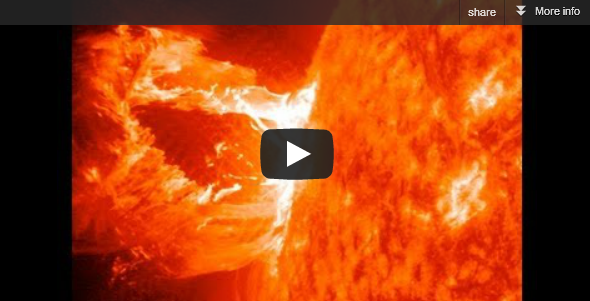
Sunspot 1466 released M1 solar flare
Spectacular M1.7 solar flare at northeastern limb
Sun-diving comet and Earth directed CME
May
Solar activity increased again this month, with 12 M-class flares ejected, with strongest the M5.7 flare produced by Active region 1476 on May 10. “Monster” sunspot complex 1476 was about the size of Jupiter, or eleven times the diameter of Earth. Nearly a dozen coronal mass ejections occurred in less than four days (May 3-6, 2012).
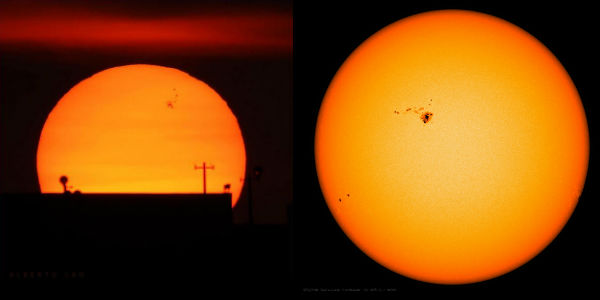
Sunspot 1476 recorded from Earth by Alberto Lao from Manila, the Phillippines (on the left) and from space by SDO spacecraft (on the right)
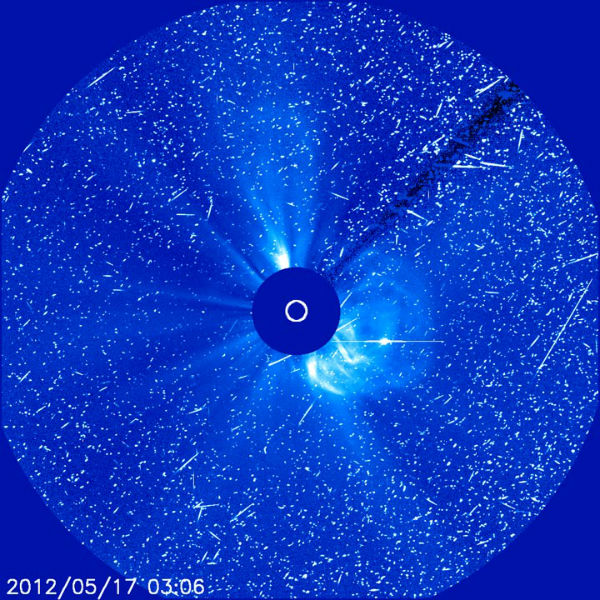
Proton particles smacking SOHO’s LASCO C3 imager 15 minutes after M5 flare on May 17, 2012 (Credit: SOHO)
Sunspot 1476 erupted with M1.4 and M1.3 flares on May 5 and M1.3 on May 6. Sunspot cluster Region 1470 and Region 1471 produced M1.1 on May 7. Multiple discrete radio frequency bursts were associated with this event, as well as a 240 sfu Tenflare lasting 12 minutes and a Type IV radio sweep. Sunspot 1476 again erupted, with M1.1 flare on May 8, M4.7, M1.8 and M4.1 on May 9 , M5.7 and M1.7 in May 10.
An M5.1 flare and a CME (coronal mass ejection) unleashed a moderate proton storm of radiation and particles into space on May 17, 2012. The particles began smacking SOHO’s LASCO C3 imager within 15 minutes of the flare.
On May 20, the first solar eclipse of 2012 occurred at the Moon’s descending node in central Taurus. An annular eclipse was visible from a 240 to 300 kilometre-wide track that traverses eastern Asia, the northern Pacific Ocean and the western United States. A partial eclipse was seen within the much broader path of the Moon’s penumbral shadow, that includes much of Asia, the Pacific and the western 2/3 of North America.
M1.4 solar flare and new large sunspot group
Sunspot 1476 unleashed a pair of M-Class flares in last 24 hours
Sunspot 1476 is crackling with solar flares, soon in geoeffective position
Long duration solar flare reaching M1.9 on May 7
Solar flare reaching M1.4 and two weak Earth-directed CMEs detected around Sunspot 1476
Three M-class flares from Region 1476 on May 9
Space weather highlights for May 07 – May 13: 55 C-class and 6 M-class flares
M5.1 solar flare generated S2 solar radiation storm
Long duration C-class event generated minor S1 radiation storm on Earth and hurled CME toward Mars
June
The Transit of Venus (June 5-6, 2012) was a much-watched astronomical event of the year. The entire transit was visible from the western Pacific Ocean, northwesternmost North America, northeastern Asia, Japan, the Philippines, eastern Australia, New Zealand, and high Arctic locations including northernmost Scandinavia, and Greenland. Probably the best view of it was from the Solar Dynamics Observatory orbiting around Earth and about 20,000 miles above it.
Sunspot 1493 produced M3.3 on June 3. A TenFlare measuring 320pfu was recorded and also a Type II emission (1077 km/s). A moderate solar flare reaching M2.1 took place on June 6. The Sun unleashed two double coronal mass ejections (CMEs) within 24 hours on June 8 – 9. The first double eruption sent clouds of particles mushrooming at just about the same time in almost opposite directions. The second blasts sent two circular clouds out into space, again at almost the same time, followed by a smaller billowing out a CME below the Sun. M1.9 and M1.8 erupted on June 9. Sunspot 1504 generated moderate solar flare measuring M1.3 June 10. M1.2 erupted on June 13. Another long duration, moderate, M1.9 solar flare erupted from Sunspot 1504 on June 14 . A 10cm Radio Burst (TenFlare) was recorded measuring 1400sfu and lasted for 103 minutes.
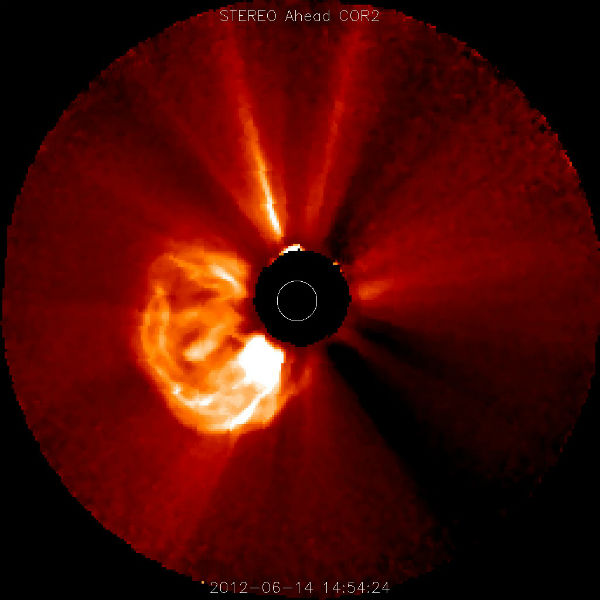
Giant sunspot 1504 produced M 1.9 on June 14 (Credit: STEREO/NASA)
Sunspot 1513 released M2.4 solar flare on June 28 and M2.2 on June 29 and M1.0 and M1.6 on June 30.
Peak of solar maximum on the way – rare type of solar storm sent a barrage of high-energy solar particles
Moderate solar flare reaching M3.3 on June 3
Powerful solar tsunami along with yesterdays impulsive M3-Class solar flare
Moderate solar flare reaching M2.1 took place on June 6
M1.9 solar flare on June 9
Second M-class solar flare today – M1.8
Impulsive M1.3 solar flare on June 10
Long duration solar flare eruption measuring M1.2 ON jUNE 13
Another long duration solar flare erupted from Sunspot 1504 – M1.9
Double CME targets Earth
Sunspot 1513 released M2.4 solar flare
Sunspot 1513 unleashed second M-class solar flare – waves of ionization over Europe
Sunspot 1513 generated M1.0 solar flare
A moderate M1.6 solar flare around Sunspot 1513
July
July was another exciting month to full of solar activity. Alltogether, Sun unleashed 29 M-class and two X-class events in July 2012.
Sunspot 1513 produced an M2.8 flare on July 01. An M-class solar flare reaching M5.6 occurred on July 2 from Region 1515. An R2 Moderate radio blackout was reported. This event generated a 10cm Radio Burst (TenFlare) along with a Type II Sweep Frequency Event. Nine hours later, same sunspot produced another M-class flare, this time M3.8.
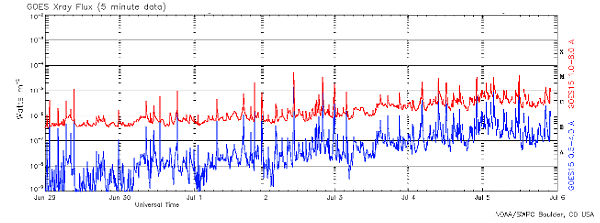
Solar X-ray flux showing increased activity from June 29 – July 6 (Credit: NOAA/SWPC)
July 4 was very active day – Sun produced 6 M-class flares. The day started with M2.3, then five hours later M5.3 followed by M2.8 and M1.3 more than two hours later. All those flares originated from huge Sunspot 1515. Sunspot 1513 produced M1.8 and M4.6 flares. More than 25 C-class flares occurred in 48 hours period. On July 5, Sunspot 1515 produced ten more M-class flares with biggest reaching M6.1.
After dozens of M-class flares, a major solar flare reaching X1.1 occurred on July 6. The flare was centered around Sunspot 1515. Strong R3 radio blackout and 10cm Radio Burst as well as Type IV Sweep Frequency Event were registered.

A giant sunspot AR 1515 unleashed strong X1.1 flare on July 6. This event triggered a 10cm Radio Burst and a Type IV Sweep Frequency Event. (Credit: SOHO)
Very active Sunspot 1515 produced another strong M-class solar flare, reaching M6.9 on July 8. Two M-class flares – M2.0 and M3.0, occured on July 10.
On July 12, an X1.4 flare erupted from Active region 1520, located at the center of the Sun. The same sunspot also emitted a moderate M7.7 flare on July 19.
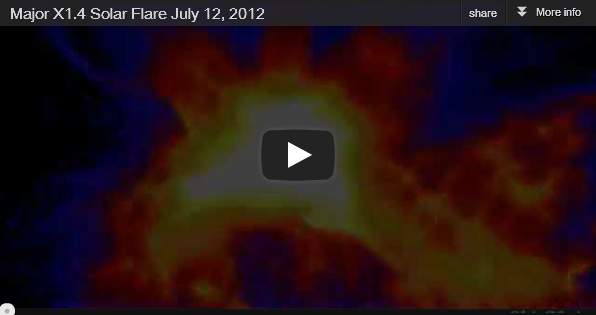
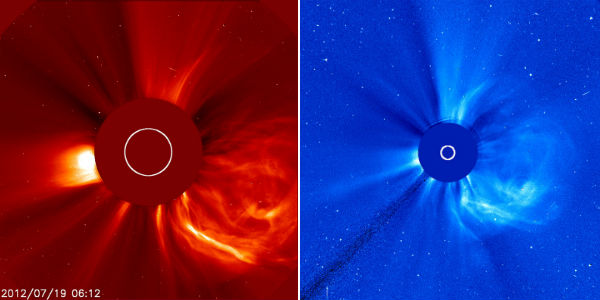
Magnetic active region 1520-1521 erupted on July 19, 2012 at the edge of the Sun, producing an M7.7 flare. Associated with the flare was a coronal mass ejection observed by SOHO’s two coronagraphs. The small, white particles splattering the CCD for hours after the eruption are high-energy protons moving at half the speed of light. The front edge of the mass ejection was clocked at over 2 million miles an hour. (Credit: SOHO)
Emerging Sunspot 1532 unleashed M2.7 flare on July 27, M6.1 flare on July 28 and M2.3 flare on July 29. New Active Region 1536 ended this very exciting month with a moderate M1.1 flare.
M2.8 solar flare on July 1
Solar flare reaching M5.6 on July 2
Another M-class solar flare – M3.8
Increased solar activity – Third M-class solar flare from Sunspot 1515
Moderate to high solar activity for beginning of July
Restless Region 1515 just produced an M-class solar flare on July 4
Another strong M-class solar flare again – M5.3 from Region 1515 + M2.3
Solar activity increased to high levels – July 4, 2012 summary
Two more M-class events from Sunspot 1515 – M2.4 and M 2.2
Sun ain’t giving us a rest – after series of M-class events, another M6.1
Major solar flare reaching X1.1 on July 6
Welcome to active solar July! X-flare, geomagnetic storming, new sunspots
Strong solar flare reaching M6.9 on July 8
Two new M-class flares and geomagnetic storming in progress
Major, Earth directed and long duration X1.4 solar flare erupted from Sunspot 1520
Region 1520 sends another M-class solar flare – M7.7 not Earth directed
Region 1532 erupted with M2.7 solar flare
Region 1532 unleashed another M-class solar flare – M6.1
Sun unleashed M2.3 solar flare
Region 1536 erupted with M1.1 solar flare
August
After a week of low solar activity, a moderate M1.6 solar flare occurred on August 6. Sunspot 1548 produced impulsive M2.4 and M1.0 flares on August 17, then three more M-class flares on August 18 – M5.5, M1.8 and M2.0. A moderate M1.3 flare occurred on August 30.
On August 31, a long solar filament erupted out into space. Spectacular solar filament eruption, thousands of kilometers long, occurred at the Sun’s southeast quadrant. The CME traveled at speed of over 900 miles per second. Extreme ultra-violet pulses are caused waves of ionization around the dayside of our planet. The extra ionization altered the propagation of very low-frequency radio signals around northern Europe. The CME was only partially directed toward Earth but it did connect with Earth’s magnetosphere causing aurora to appear on the night of Monday, September 3.
Moderate solar flare – M1.6 on August 6
Impulsive M2.4 solar flare on August 17
The second M-Class flare today around the new active region
New active region produced strong M5.5 solar flare on August 18
Two more M-class events from Region 1548 – M 1.8 and M 2.0
Moderate solar flare reaching M1.3 on August 30
Spectacular filament eruption, waves of ionization and Sun’s polar magnetic field shift for end of August
September
Sunspot 1560 erupted with moderate M1.6 flare on September 6. Sunspot 1564 produced M1.4 long duration flare on September 8 and M1.2 on September 9.
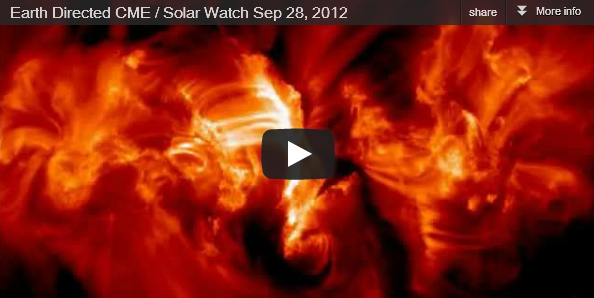
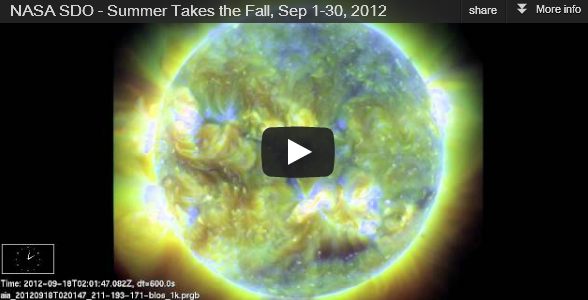
Moderate solar flare M1.6 on September 6
Sunspot 1564 unleashed another solar flare reaching M1.2 on September 10
Several strong solar flares and CME’s seen at farside on September 20
Solar prominence observed at eastern limb on September 23
Long duration C3.7 solar flare erupted with Earth directed CME on September 28
October
An M2.3 flare erupted on October 8. On October 9/10, two moderate M-class flares occurred – M1.7 and M1.2. Sunspot 1598 produced strong solar flare reaching M9.0 erupted on October 20, followed by M1.3 flare on October 21 and M5.6 on October 22. But that was only introducing into 7th X-class solar flare in 2012 which erupted on October 23 as X1.8 flare. It produced strong R3 radio blackout storm. Radiation from the flare created waves of ionization in the upper atmosphere over Asia and Australia.
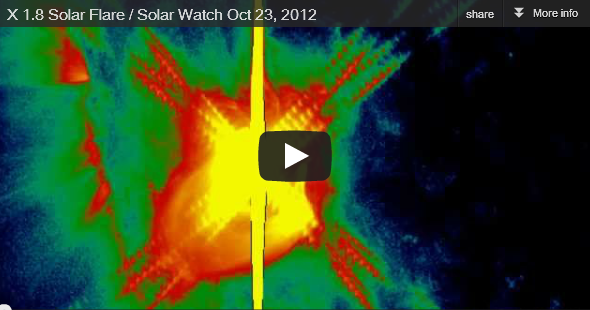
M-class solar flare measuring M2.3 erupted on October 8 – G2 class geomagnetic storm in progress
Moderate solar activity – M2.3 solar flare, G2 geomagnetic storm
Two moderate M-class solar flares on October 9/10
Strong solar flare reaching M9.0 took place on October 20
M1.3 solar flare erupted from Region 1598 on Ocotber 21
Moderate solar flare reaching M5.6 on October 22
Sunspot 1598 generated impulsive X1.8 solar flare on October 23
November
November’s Sun produced 14 M-class flares, with biggest reaching M6.0 on November 13. The Sun produced a series of at least eight coronal mass ejections (CME’s) from November 2-4.
Solar flare measuring M1.7 erupted on November 8 from Sunspot 1611. Filament eruption around sunspot 1608 hurled CME toward Earth on November 9. Giant plasma filled prominence occurred on the southwest limb on November 11 followed by M1.0 flare. Active region 1613 produced M2.0 flare on November 12.
The same region erupted 4 M-class flares on November 13 – M2.0, M6.0, M2.5 and M2.8. On November 20, Sunspot 1611 generated a moderate solar flare reaching M1.7 and Sunspot 1618 produced M1.7 flare. More solar flares erupted from Active Region 1618, which was ten times wider than Earth at the moment. Moderate M1.4 and M3.5 erupted on November 21. A Type II and Type IV Radio Emissions and 10cm Radio Burst (TenFlare) were reported indicating a strong Coronal Mass Ejection (CME). After some quiet time, Region 1618 erupted with another M-class solar flare reaching M1.6 on November 27. The same day, Active region 1620 generated M1.1 flare. Extreme UV radiation from this explosion created some waves of ionization in Earth’s atmosphere above North America and Europe. Growing Sunspot 1620 erupted M2.2 flare on November 28.
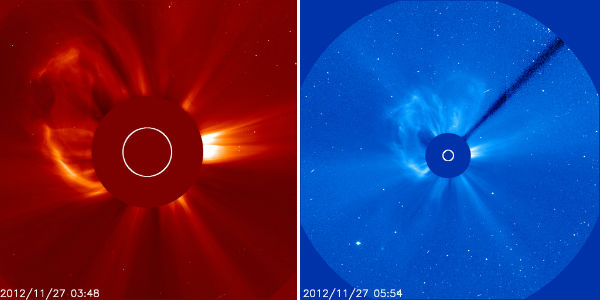
November 27 CME seen on SOHO’s LASCO C2 and LASCO C3 coronographs (Credit: SOHO/LASCO)
In November, we saw the second, total solar eclipse of 2012 which occurred at the Moon’s ascending node in central Libra. The path of the Moon’s umbral shadow crossed the South Pacific Ocean where it made no landfall except for northern Australia. The Moon’s penumbral shadow produced a partial eclipse visible from a much larger region covering the South Pacific (including Australia and New Zealand), southern South America, and part of Antarctica.
STEREO satellites recorded 8 CME’s over two-day period
M1.7 solar flare erupted from Region 1611 – backsided full-halo CME observed
Solar filament eruption sent Earth-directed CME on November 10
Sun produced spectacular plasma prominence and backsided M1.0 flare on November 11
While Earth expects CME impact, Sunspot 1613 produced M2.0 solar flare on November 13
Third M-class solar flare in a row from Region 1613 – M2.0, M6.0, M2.5
Moderate solar flare measuring M2.8 peaked from Region 1613
Large prominence eruption and C8.4 solar flare – November 16
Moderate solar flare reaching M1.7 erupted from Sunspot 1611 on November 20
Second M-class solar flare of the day – M1.6
M1.4 solar flare with Earth directed CME erupted from Region 1618 on November 21
Popping M-class flares – M3.5 solar flare
Moderate solar flare reaching M1.6 erupted from Region 1618 on November 27
Growing Sunspot 1620 produced moderate M1.1 solar flare on November 28
Sunspot 1620 generated M2.2 solar flare onNovember 29
December
December was the most quiet month of the 2012 year considering solar activity. No M-class flares, only minor C-class flares and some unsettled geomagnetic conditions. Year ended with nice auroras around Arctic Circle on December 31.
Well, this year was pretty exciting, we hope you’ll stay with us in 2013, experiencing maximum peak of Solar Cycle 24 with us.
Solar activity highlights
What does a solar storm sound like?
The Sun heading towards its Solar Maximum – Retrospective of events (January 1, 2012 – March 13, 2012)
Unusual magnetic changes in the Sun – The north pole of the Sun had started flipping about a year earlier than expected
2 months of live feed of the sun by GOES-15
NASA’s Fermi Gamma-ray Space Telescope detected the highest-energy light ever associated with an eruption on the Sun
Dynamic Earth – watch how solar storms affect our planetary system
Solar Proton Events Affecting the Earth Environment (1976 to present)
Peak of solar maximum on the way – rare type of solar storm sent a barrage of high-energy solar particles
Hope that was a good read for you. Thanks to the Witches for all the information, lets hope 2013 is a good year for us in this hobby at least 😉

